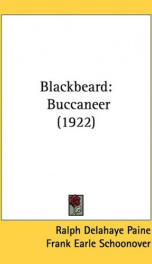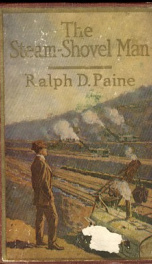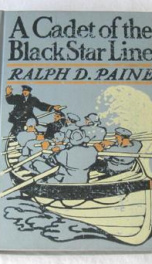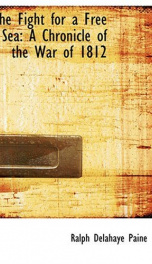Blackbeard: Buccaneer

From Content: "THE year of 1718 seems very dim and far away, but the tall lad who sauntered down to the harbor of Charles Town, South Carolina, on a fine, bright morning, was much like the youngsters of this generation. His clothes were quite different, it is true, and he lived in a queer, rough world, but he detested grammar and arithmetic and loved adventure, and would have made a sturdy tackle for a modern high-school football team. He wore a peaked straw hat of Indian[8] weave, a linen shirt open at the throat, short breeches with silver buckles at the knees, and a flint-lock pistol hung from his leather belt. He passed by scattered houses and stores which were mere log huts loopholed for defense, with shutters and doors of hewn plank heavy enough to stop a musket ball. The unpaved lanes wandered between mud holes in which pigs wallowed enjoyably. Negro slaves, half-naked and bearing heavy burdens, jabbered the dialects of the African jungle from which they had been kidnapped a few months before. Yemassee Indians clad in tanned deer-skins bartered with the merchants and hid their hatred of the English. Jovial, hard-riding gentlemen galloped in from the indigo plantations and dismounted at the tavern to drink and gamble and fight duels at the smallest excuse. Young Jack Cockrell paid scant heed to these accustomed sights but walked as far as the wharf built of palmetto piling. The wide harbor and the sea that flashed beyond the outer bar were ruffled by a piping breeze out of the northeast. The only vessel at anchor was a heavily sparred brig whose bulwarks were high enough to hide the rows of cannon behind the closed ports. The lad gazed at the shapely brig with a lively curiosity, as if here was something really interesting. Presently a boat splashed into the water and was tied alongside the vessel while a dozen of the crew tumbled in to[9] sprawl upon the thwarts and shove the oars into the thole-pins. An erect, graceful man in a red coat and a great beaver hat roared a command from the stern-sheets and the pinnace pulled in the direction of the wharf. "Pirates, to be sure!" said Jack Cockrell to himself, without a sign of alarm. "'Tis Captain Stede Bonnet and his Royal James. I know the ship. I saw her when she came in leaking last October and was careened on the beach at Sullivan's Island. A rich voyage this time, for the brig rides deep." The coast of South Carolina swarmed with pirates two hundred years ago, and they cared not a rap for the law. Indeed, some of these rascals lived on friendly terms with the people of the small settlements and swaggered ashore to squander the broad gold pieces and merchandise stolen from honest trading vessels. You must not blame the South Carolina colonists too harshly because they sometimes welcomed the visiting pirates instead of clapping them in jail. Charles Town was a village at the edge of a wilderness filled with hostile Indians. By sea it stood in fear of attack by the Spaniards of Florida and Havana. There were almost no crops for food and among the population were many runaways from England, loafers and vagabonds who hated the sight of work. The pirates helped them fight their enemies and did a thriving trade in goods that were sorely needed. Respectable[10] citizens grumbled and one high official was removed in disgrace because he encouraged the pirates to make Charles Town their headquarters, but there was no general outcry unless the sea-rovers happened to molest English ships outside the harbor. It was Captain Stede Bonnet himself who steered the pinnace and cursed his sweating sailors in a deep voice which went echoing across the bay. He made a brave figure in his scarlet coat, with the brass guard of his naked cutlass winking in the sun."
Info about the book
Author:
Series:
Unknown
ASIN:
B004TRQ3BU
Rating:
5/5 (4)Your rating:
0/5
Languge:
English
Users who have this book
Users who want this book
What readers are saying
What do you think? Write your own comment on this book!
write a commentGenre
if you like Blackbeard: Buccaneer try:
Do you want to read a book that interests you? It’s EASY!
Create an account and send a request for reading to other users on the Webpage of the book!














